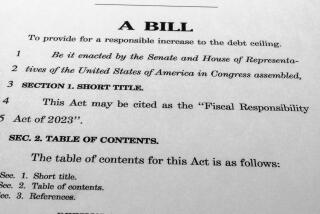Bush Achieves Patients’ Bill Compromise
- Share via
WASHINGTON — President Bush scored a political victory on patients’ rights legislation Wednesday, persuading a Republican co-sponsor of a Democrat-backed bill to switch sides and support a White House compromise that now is poised to pass the House as soon as today.
Rep. Charlie Norwood of Georgia, who for the last five years has bucked his party’s leadership on a patients’ bill that carries his name, abruptly abandoned his co-sponsors and cut a separate deal with Bush that would place stricter limits on patients’ ability to sue their health plans.
While lawmakers have agreed on an array of new protections for the approximately 190 million Americans with private health insurance, a key element of Wednesday’s compromise would limit pain-and-suffering and punitive awards to $1.5 million each for patients who sue their health maintenance organizations.
The last-minute agreement stunned Norwood’s longtime allies, who were awaiting his arrival at an afternoon strategy meeting even as he was preparing to step to the podium at the White House with Bush.
Norwood’s dramatic decision reversed the course of the patients’ rights debate in an instant, deflating Democrats who had appeared to hold every advantage on the issue and elating Republicans who had been dreading a political drubbing.
But the deal leaves a cloud over the long-term prospects of the patients’ bill. House passage of the legislation in the form Bush is willing to sign would set the stage later this year for bruising negotiations with the Senate, which passed a more sweeping version of the patients’ bill in June.
Bush, who repeatedly threatened to veto the bill Norwood had been co-sponsoring, described their agreement as a breakthrough for bipartisanship.
Norwood, Bush said, “was practicing the art of what is possible. It’s a spirit we need more of in Washington: people who come to this city with the intent of doing what’s right, the intent of having accomplishment, . . . of not . . . bickering over politics.”
For his part, Norwood acknowledged that his co-sponsors were disappointed with his decision but said he believed he had to compromise to ensure that a bill expanding the rights of patients would be signed into law.
“The deal had to be cut by somebody,” said Norwood, who holds sway with a key bloc of Republican votes. “I was the somebody.”
Norwood’s co-sponsors condemned the agreement and lamented that he reached it without consulting them, or even notifying them before it was announced.
“I’m deeply disappointed,” said Sen. Edward M. Kennedy (D-Mass.), a co-sponsor of the Senate bill. “The proposal [Bush and Norwood] put forward tonight continues to make [patients’] rights unenforceable and puts HMOs ahead of patients.”
The compromise Bush and Norwood reached centers on what long has been the main sticking points in the debate: How broad should be a patient’s right to sue over denials or delays of treatment, and how much could be awarded in damages.
Democrats have sought to roll back an obscure 1974 law that shields health plans from legal liability in most cases. Their bill would allow patients to collect unlimited damages for pain and suffering and punitive damages of up to $5 million.
Bush has fought these proposals fiercely, arguing that they would lead to frivolous lawsuits and dramatically drive up the cost of health insurance. Instead, he has backed an alternative GOP bill that would cap pain-and-suffering awards at $500,000 and ban punitive damages altogether.
But when it became clear that Democrats had the votes to prevail in the House, Bush entered last-minute negotiations with Norwood.
The deal carries additional restrictions beyond the $1.5-million caps on pain-and-suffering and punitive damages. Patients could only collect punitive damages in cases in which health plans refuse to abide by the ruling of an independent review panel. And while suits against health plans could be filed in state or federal court, a single federal standard--not a patchwork of state laws--would apply.
Democrats protest that such arrangements would preserve a privileged status for health insurers, shielding them from the state laws that doctors are subject to when they are sued over their treatment decisions.
“This is a bad proposal for American families,” said Sen. John Edwards of North Carolina, another of the Democrats with whom Norwood had been allied. “It maintains the special treatment HMOs have.”
But House Speaker J. Dennis Hastert (R-Ill.) praised the deal as “a balanced approach to health care reform.”
“We should not put trial lawyers first,” Hastert said. “We should not put HMOs first. We should put patients first, and this hard-fought compromise gets us to that position.”
Norwood and House GOP leaders worked Wednesday night to draft the language of his agreement with Bush and said it would be offered as an amendment during debate on the issue. As of Wednesday night, GOP leaders had scheduled that debate for today, though complications in the drafting process could cause a postponement to Friday.
Despite the rancor over the liability provisions, both sides have long been in general agreement on the bulk of the legislation, which would give patients direct access to pediatricians, gynecologists and other specialists, guaranteed coverage for emergency room care and the right to participate in certain clinical trials.
But some experts warned that, because the Bush-Norwood deal would impose a single federal standard, it could jeopardize recent right-to-sue laws passed in California and several other states.
Norwood’s deal capped weeks of maneuvering on the patients’ rights issue. The bill was initially scheduled for a House vote a few weeks ago but was delayed--and then yanked off the schedule entirely--by GOP leaders who feared they lacked the votes to defeat it.
Wednesday afternoon, Norwood’s co-sponsors were speaking to reporters, expressing their unshakable confidence in Norwood’s loyalty, even as he was signing off on his deal with Bush. The co-sponsors learned of Norwood’s switch only after he appeared on television with the president.
“A phone call would have been nice,” said Rep. Greg Ganske (R-Iowa).
Norwood explained his decision to colleagues later at an evening meeting in the offices of House Minority Leader Richard A. Gephardt (D-Mo.).
“I’ve been worked on by every side there is,” Norwood told reporters. Still, he insisted “that has very little to do with my decision to go to the president and say, ‘What do we need to do to get your signature?’ ”
*
Times staff writer Janet Hook contributed to this story.
More to Read
Get the L.A. Times Politics newsletter
Deeply reported insights into legislation, politics and policy from Sacramento, Washington and beyond. In your inbox twice per week.
You may occasionally receive promotional content from the Los Angeles Times.







